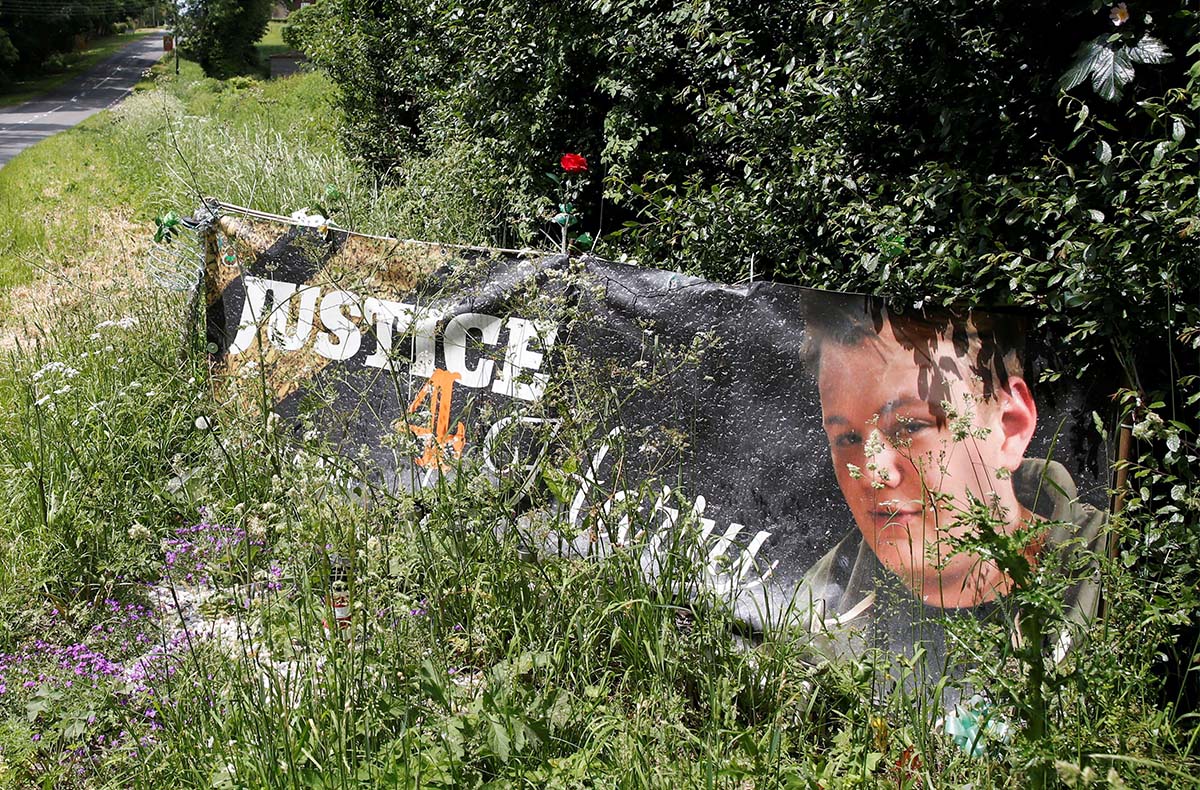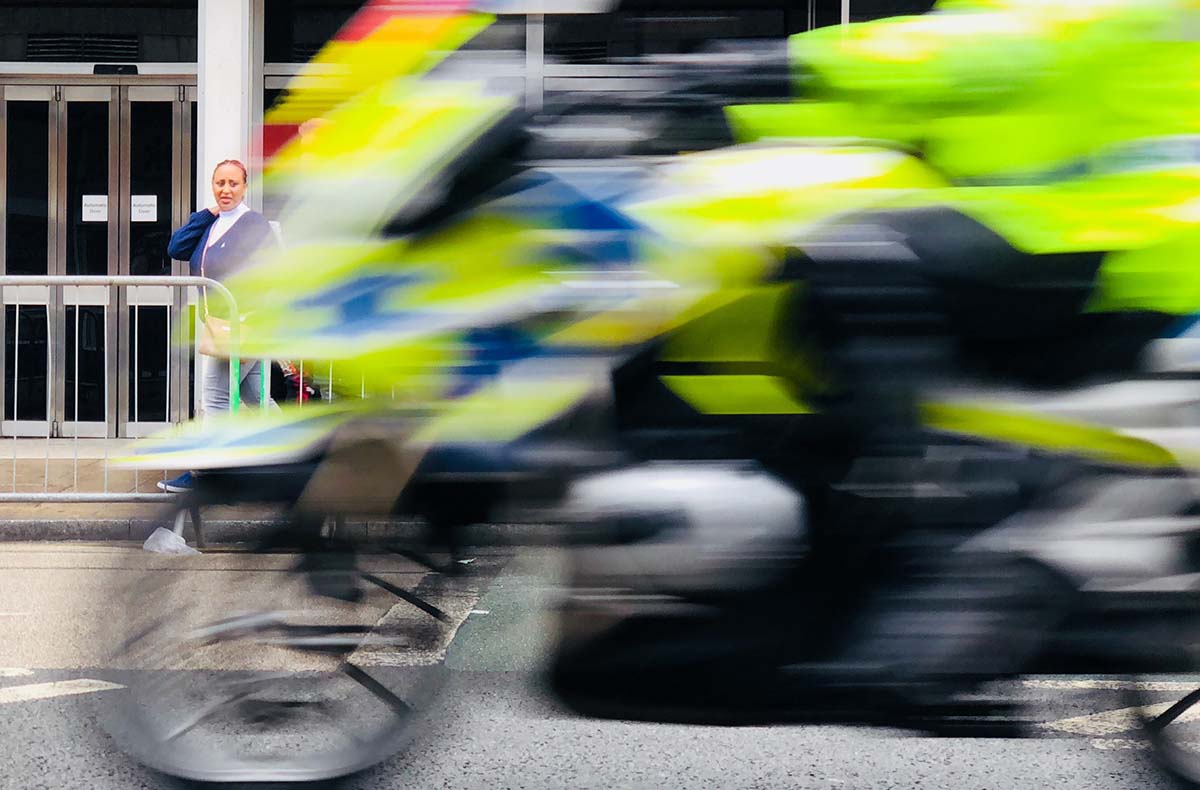
When driving from RAF Croughton towards the tiny Northamptonshire village of the same name, motorists encounter glistening road-marks directing them to stay in the left lane.
Around 100m further on, a worn tarmac sign reminds travelers to hug the left side. Two-hundred meters ahead lies a grim reminder of why. On a grass verge sits a lovingly-maintained tribute to Harry Dunn, an 18-year-old man killed when the careless driver of an SUV on the wrong side of the road crashed into his motorbike.
RAF Croughton is a British military base used as a “listening station” by the United States Air Force (USAF) and Central Intelligence Agency (CIA). Consequently, it is full of spies (or “spooks”).
After the collision that killed Harry on August 27, 2019, it was quickly established that the SUV driver was 43-year-old US citizen Anne Sacoolas: the wife of CIA employee Jonathan Sacoolas, who worked at RAF Croughton.
Anne Sacoolas quickly admitted driving on the incorrect (right-hand) side of the road. It is a mistake scores of Americans, trained to drive on the right, make when they arrive in the UK. But Sacoolas’ carelessness had tragic consequences.
Nobody doubts that Harry Dunn was killed accidentally. Anne Sacoolas meant him no harm. She had two children in the back of her car and would have believed she was driving safely. But Sacoolas’ reaction to Harry’s death, and that of her senior US advisers, has generated significant levels of anger within the British public, and disappointment in officials on both sides of the Atlantic.
Immediately after the collision, Sacoolas stayed at the scene and assisted Northamptonshire Police.
But during her interview the following day, Sacoolas raised the prospect of diplomatic immunity. Detectives were alarmed. This was a simple, albeit tragic, road traffic collision in a friendly state—hardly the Cold War-era shenanigans between rival superpowers that necessitates immunity.
Sacoolas’ elusive reaction felt inappropriate—so police requested an immunity waiver so that the case could, in theory, be prosecuted.
Perhaps fearing prison, Sacoolas fled the UK three weeks later and claimed diplomatic immunity—supported by US officials who argued she qualified due to her husband’s CIA role. To many UK journalists, it felt like important information had not yet been declared.
It later transpired that an official at the UK Foreign and Commonwealth Office (FCO) had sent a text to US officials tacitly approving Sacoolas’ “midnight flit.” It also emerged the FCO asked police not to inform Harry’s family that Sacoolas had left the country “for a day or two.”
Harry’s blue-collar family were furious. Some British experts and media speculated that political or diplomatic favors had been agreed to protect US-UK relations—at the expense of a grieving family.
Months later, what many journalists suspected was confirmed by Sacoolas’s lawyer: she was also a spook at the time of Harry’s death. She has since left her intelligence role.
While Sacoolas continued to assist police from the comfort of her home in Virginia, there was little prospect of her return to the UK. That was heart-breaking news to Harry’s dignified family.
For three years, riding a wave of public support, the Dunns lobbied to ensure the wheels of British justice turned—even in circumstances where some officials on both sides of the Atlantic wished away the diplomatically sensitive case.
The Dunns and their legal team forced a review of diplomatic immunity at RAF Croughton, attempted to doorstep UK foreign secretary Dominic Raab at election hustings, submitted judicial review requests, forced the UK government to make a formal extradition request (denied by the US), and threatened Sacoolas with a US-based civil lawsuit.
Dunn family members even kept their dignity during a bizarre intervention by then-US president Donald Trump, who invited Harry’s parents to the White House in October 2019. Once proceedings were underway, Trump surprised everybody by revealing that Anne Sacoolas was waiting in a room next door and that she was prepared to meet the family.
The Dunns deemed the arrangement inappropriate and insisted any face-to-face with Sacoolas should take place on UK soil.
Three years later, Sacoolas finally pleaded guilty to causing death by careless driving. She was acquitted of the more serious charge of causing death by dangerous driving.
But even in admitting her guilt in court, Sacoolas managed a final insult to the Dunn family and British justice system. Under legal and US government advice, she declined to attend court in person—appearing instead by video link. On this side of The Pond, the former spy was branded a coward for failing to face Harry’s parents across a UK courtroom.
On December 8, 2022, Anne Sacoolas was sentenced to eight months imprisonment—suspended for 12 months. She will not serve prison time unless she breaches her probation conditions.
After years of struggle against powerful forces, the Dunn family had delivered on their promise to see justice done.
In a statement delivered at her sentencing, Sacoolas expressed remorse. “My tragic mistake led to the loss of Harry, and I live with this regret every single day,” she said.
“There is not a day that goes by that Harry isn’t on my mind, and I am deeply sorry for the pain that I have caused. It’s for this reason that I have been so committed to a resolution to this case since 2019.”
Sacoolas’ claim to be “committed” to a resolution, while undoubtedly true on a legal level, heaped insult upon injury to the Dunn family who had fought for years to bring her back to the UK.
Many believe Sacoolas received a light sentence. Others say that, considering Harry’s death resulted from a genuine accident, her punishment was appropriate. I don’t have a firm view. But what is clear is that the ex-spook and her advisers showed at least some disregard for the justice system within a state which initially welcomed her. Their decisions have soured relations between close allies, which will take time to rebuild.



